
Have a question? Call now! +1 646 810 8764

Welcome to Luxury Lifestyle Awards!
Would you like to talk to one of our award managers about nomination of your company?
Our team is happy to help with any questions you may have.
Call: +1 646 810 8764 Send Email Live Chat Contact Us20.11.2023
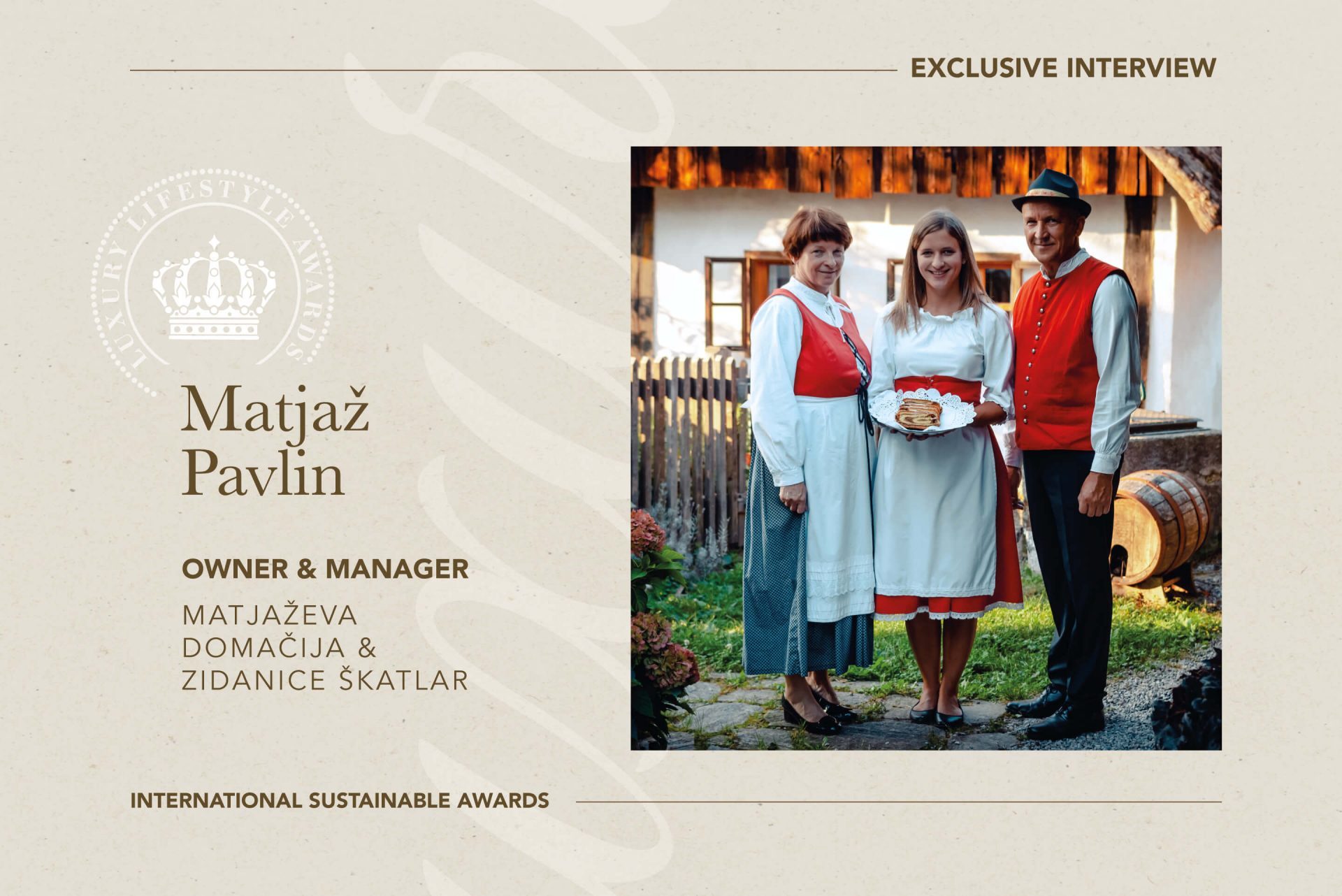
Matjaževa domačija & Zidanice Škatlar receives the International Sustainable Award 2023 in recognition of their creative and resource-efficient way of preserving national heritage in Matjaževa domačija & Zidanice Škatlar, nestled in the heart of Slovenia. Owner and manager Matjaz Pavlin, along with his dedicated team, has crafted a remarkable story of heritage preservation and sustainable tourism in this picturesque corner of the world.
Their commitment to restoring historic buildings, introducing unique tourist offerings, and championing organic farming has not only earned them the prestigious international accolade but also captured the imagination of visitors from far and wide. In this exclusive interview, we delve into Matjaz Pavlin’s journey, learning about the inspiration behind his work and his vision for the future of sustainable tourism in the Dolenjska region of Slovenia.
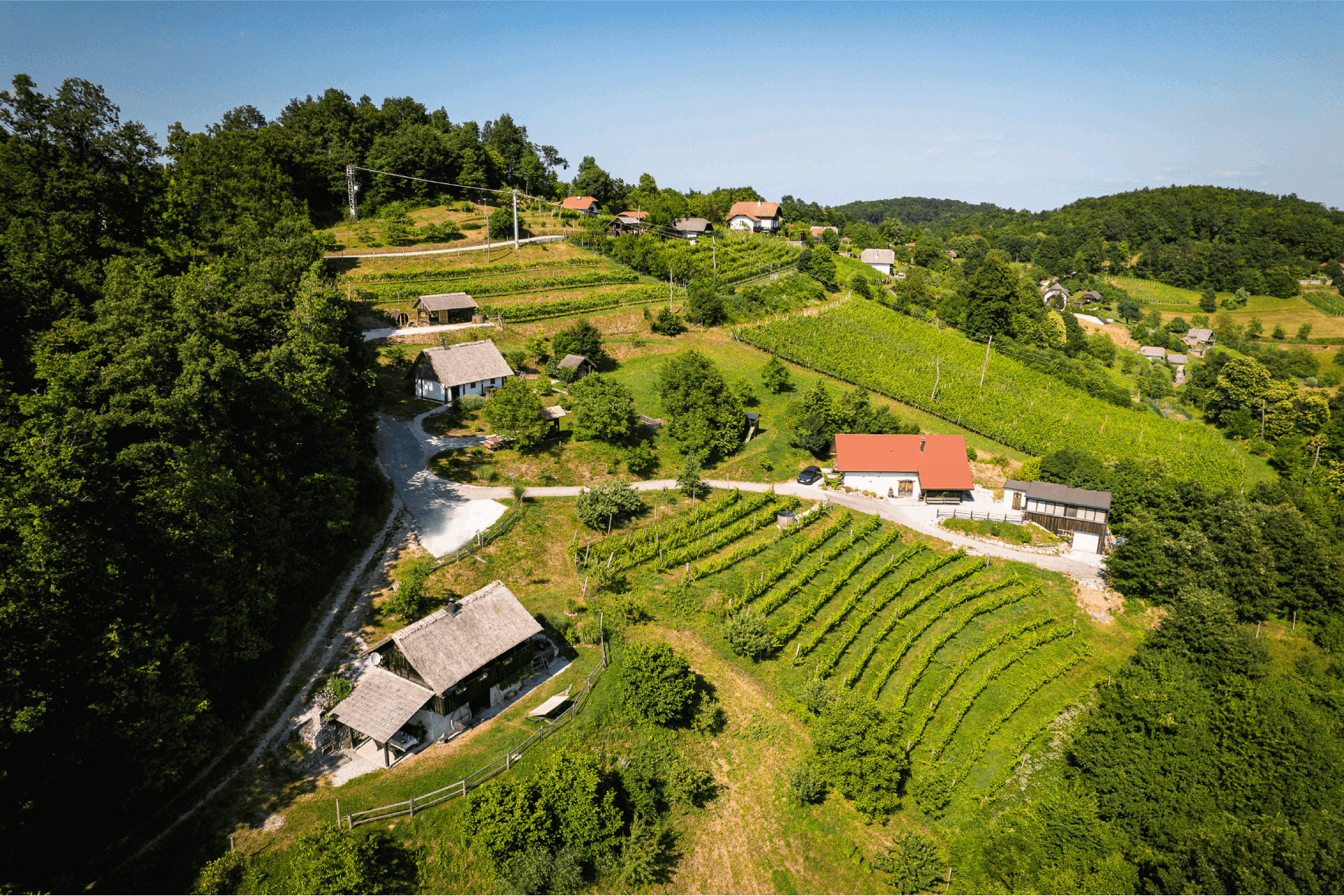
International Sustainable Awards (ISA): Congratulations on winning the International Sustainable Award for your exceptional work in preserving national heritage in Slovenia. Can you tell us about the inspiration behind the establishment of Matjaževa domačija & Zidanice Škatlar?
Matjaz Pavlin (M.P):
Ever since I was a child, I’ve been fascinated by history and everything old: old buildings, customs, traditions, and all our tangible and intangible heritage. It is a scientifically proven fact that most people feel much better in spaces that have some tradition and a connection to the past, as opposed to new, sterile spaces. Of course, this doesn’t mean that these “old buildings” can be neglected; on the contrary, they must be well-maintained. They have a certain patina and “soul,” as we usually say, making people feel at home and relaxed. They transport us back to the magical world of our ancestors. Therefore, I set my life goal to try to save and restore as many old buildings as possible and allow modern tourists, who now live and work in “city silos,” to travel back to nature, to an authentic, untouched environment, to fairy-tale restored buildings.
ISA: The preservation of cultural heritage is a significant part of your mission. Could you elaborate on the specific steps and challenges you faced in restoring and renovating the historic buildings on your property?
M.P:
In my professional journey, I have consistently embraced a philosophy of gradual progress, navigating each step with precision and dedication. Notably, a significant portion of our renovation endeavors was financed through our own resources or smaller loans. Our strategic approach involved completing one building at a time, allowing it to generate income before embarking on the restoration of the next. While this approach may seem less ambitious, it serves as a secure and sustainable path to development. In the restoration process, we were very meticulous, sometimes even more so than the Institute for the Protection of Cultural Heritage, which closely monitored us. This work is not easy; it requires a lot of patience, consistency, and innovation. We never opted for the easier path but rather chose the one that would be better, more efficient, and more attractive in the long run. The result is immense satisfaction at the end of the work, looking at beautifully restored buildings, and even greater satisfaction when our guests are enthusiastic about them.
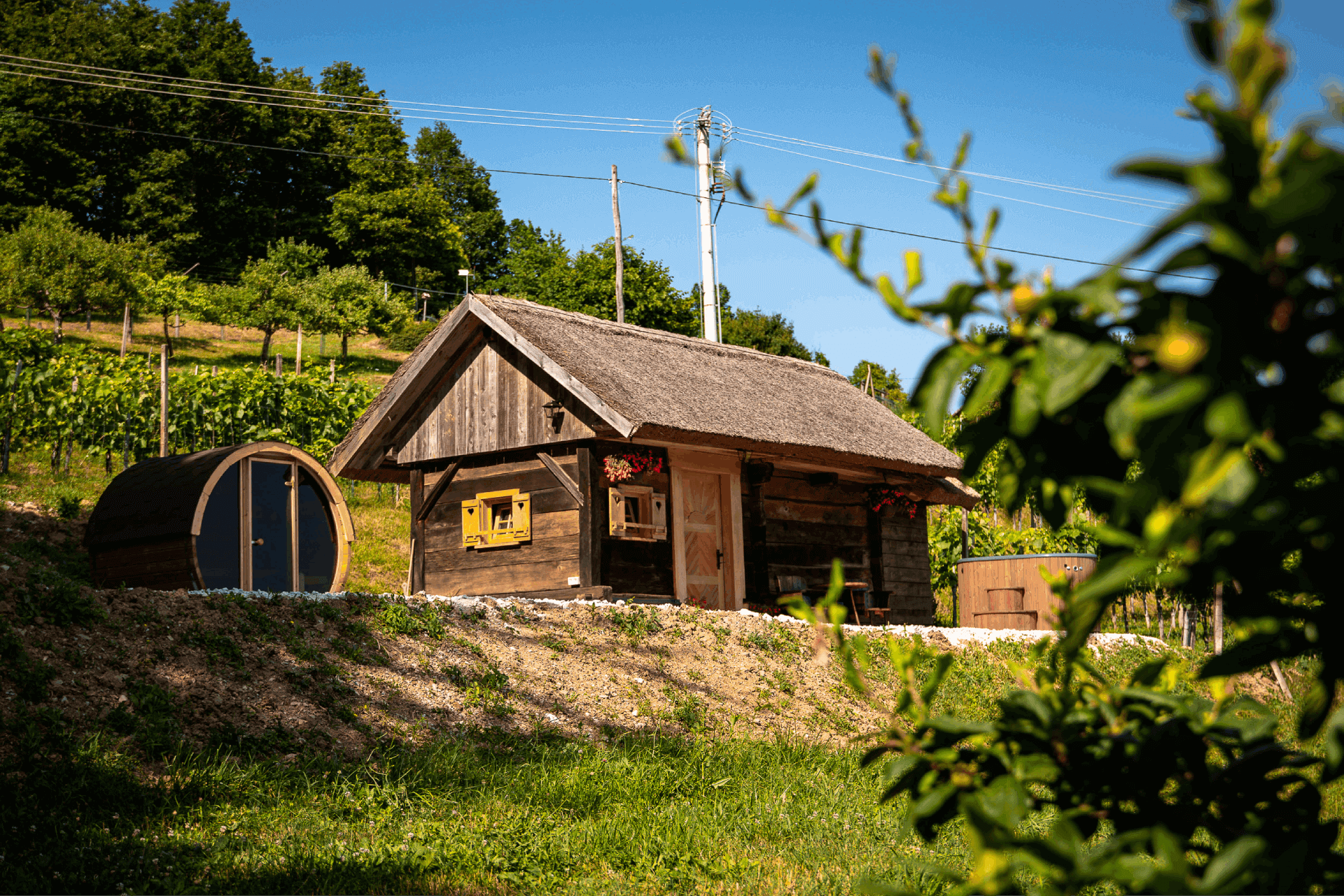
ISA: “The Story of Cviček” is a remarkable initiative that showcases the history and culture of the Dolenjska region. What motivated you to create this project, and what kind of impact has it had on your visitors?
M.P:
Cviček is a special wine that is the pride of our region. It is the only wine in Europe that can, or must, have a maximum of 10% alcohol. It is also one of only two wines in Europe where white and red grape varieties, or wines, can be officially blended, the other being The Pope’s wine in France. The third characteristic of Cviček is that it has the lowest allowed sulfur content. Due to all these properties, Cviček is a light, pleasant, and fresh wine, highly recommended for diabetics and for lowering cholesterol. With the right food and pleasant company, you can enjoy an extra glass or two without negative consequences. Over the centuries, the traditional cuisine, customs, and traditions of our region have evolved around Cviček. We have encapsulated all of this in a special multivision in nine languages, titled “The Story of Cviček,” where, in seven chapters, we present the history of the vine, wine patrons, containers, the composition of Cviček, and the process of wine production from early spring to autumn. The story provides basic knowledge and information about the grapevine, wine, and Cviček. After watching the multivision, a tasting of Cviček’s components follows. All of this takes place in a 160-year-old homestead and a barn that is over 200 years old. It’s an excellent opportunity for an authentic exploration of our tradition, cuisine, and wine.
ISA: Your vineyard cottages are beautifully restored and offer unique experiences. Could you tell us about the process of acquiring and renovating these cottages, and how they contribute to sustainable tourism in the region?
M.P:
For our region, it’s characteristic that almost every family owns a vineyard. These vineyards are small, averaging 300-800 vines. However, each vintner produces their own wine, typically Cviček, along with Blaufränkisch (Modra frankinja) and white wine. This categorizes us as a kind of “boutique wine producers,” a concept that is sometimes challenging for foreigners to grasp. Yet, it’s an integral part of our tradition, practiced for centuries and passed down from generation to generation. Each vineyard also has its own cottage, or “zidanica.” These are smaller structures, usually up to 50m2, with a cellar for wine production and storage below and well-appointed apartments above, providing everything a modern guest needs. Situated on the wine hills, they offer a splendid view enjoyed from the balcony or terrace. Each cottage includes Wi-Fi, air conditioning, a sauna, and a hot tub. Guests are given the key to the cellar, where they can pour their own wine, becoming the master of the wine cellar. On the first evening, we invite every guest to the wine cellar, where we serve them with local delights. Nearly every rural family here produces smoked meats: salami, sausages, ham, bacon, and we love sharing these with our guests. Alongside, we offer around 10 different wines, increasingly focusing on tolerant varieties that are organic and not sprayed with phytopharmaceuticals. The offer of Tourism in Cottages is unique on a global scale. Nowhere else can you become the master of a cottage and cellar in the midst of a vineyard, receive the key to the cellar, and enjoy local delicacies. We also advise guests on what they can see in our destination and where to find the best local cuisine. Our region is excellent for hiking and cycling, and just 5 km away on Otočec, you’ll find the most beautiful golf course in Slovenia with 18 holes. There’s also Otočec Castle with exceptional culinary offerings. We are highly environmentally oriented and proudly received the Green Key environmental certificate in 2022. The Tourism in Cottages product was awarded the “Sejalec” prize by the Slovenian Tourist Board in 2010 as the second most innovative tourism product in Slovenia. In 2020, we received the first prize from ECTN (European Cultural Tourism Network) as a European destination for sustainable cultural tourism in the Wine Tourism category.
ISA: Your commitment to organic farming is evident in the Regent grape vineyard, which is grown naturally. How has this initiative benefited the local environment and the quality of the wines produced?
M.P:
If you’re a lover of heritage and tradition, it’s only natural to support environmentally friendly food and wine production. We’ve been practicing this on our farm for a long time, and in viticulture, this trend is somewhat newer. There are now several so-called tolerant varieties that yield beautiful results. Ten years ago, we organized a “volunteer camp.” Students from 10 European countries visited us and stayed for 14 days. During this time, we planted an organic vineyard with the German Regent variety. The wine is exceptionally rich, strong in alcohol, and especially dark in color, indicating its outstanding health benefits. It produces a slightly smaller yield (liters per vine in a good season), but the quality is excellent. Three years ago, we planted another tolerant white variety, Muscaris (tolerant Muscat), which also yields outstanding results. Additionally, we have the local autochthonous variety Šmarnica, which is highly aromatic and among the most popular with our guests. People who come to us are generally much more enthusiastic about tolerant (organic) varieties and Cviček than conventional ones. We have many cases where they asked us for help and information on where to obtain such grapevines, both from local residents and guests from other parts of Slovenia.
ISA: Could you tell us about the cultural and natural experiences that visitors can enjoy at your homestead and vineyard cottages? What are some of the unique activities and attractions that make your offerings stand out?
M.P:
Our guests, seeking a local experience, are those who eschew mass tourism and instead look for small, hidden destinations renowned for their beauty and tradition. The initial reaction when a guest steps out of the car and surveys the stunning landscape is always inspiring. The experience intensifies in the evening as they get to know our wines and cuisine, and we offer suggestions on activities. We are deeply connected with local providers and advise guests on places to visit and where to find the best local food. Typically, guests explore the entire region and Slovenia, with many venturing into neighboring Croatia or even Venice (300 km) and Salzburg (350 km). Our vineyard cottages are conveniently located between the Slovenian capital, Ljubljana, and the Croatian capital, Zagreb—less than an hour’s drive away. Our region is especially recommended for outdoor enthusiasts, as it is ideal for hikers, cyclists, tennis and golf lovers. Many simply enjoy the peace, breathtaking views, green nature, bird songs, and the endless stars visible from the sauna or hot tub.
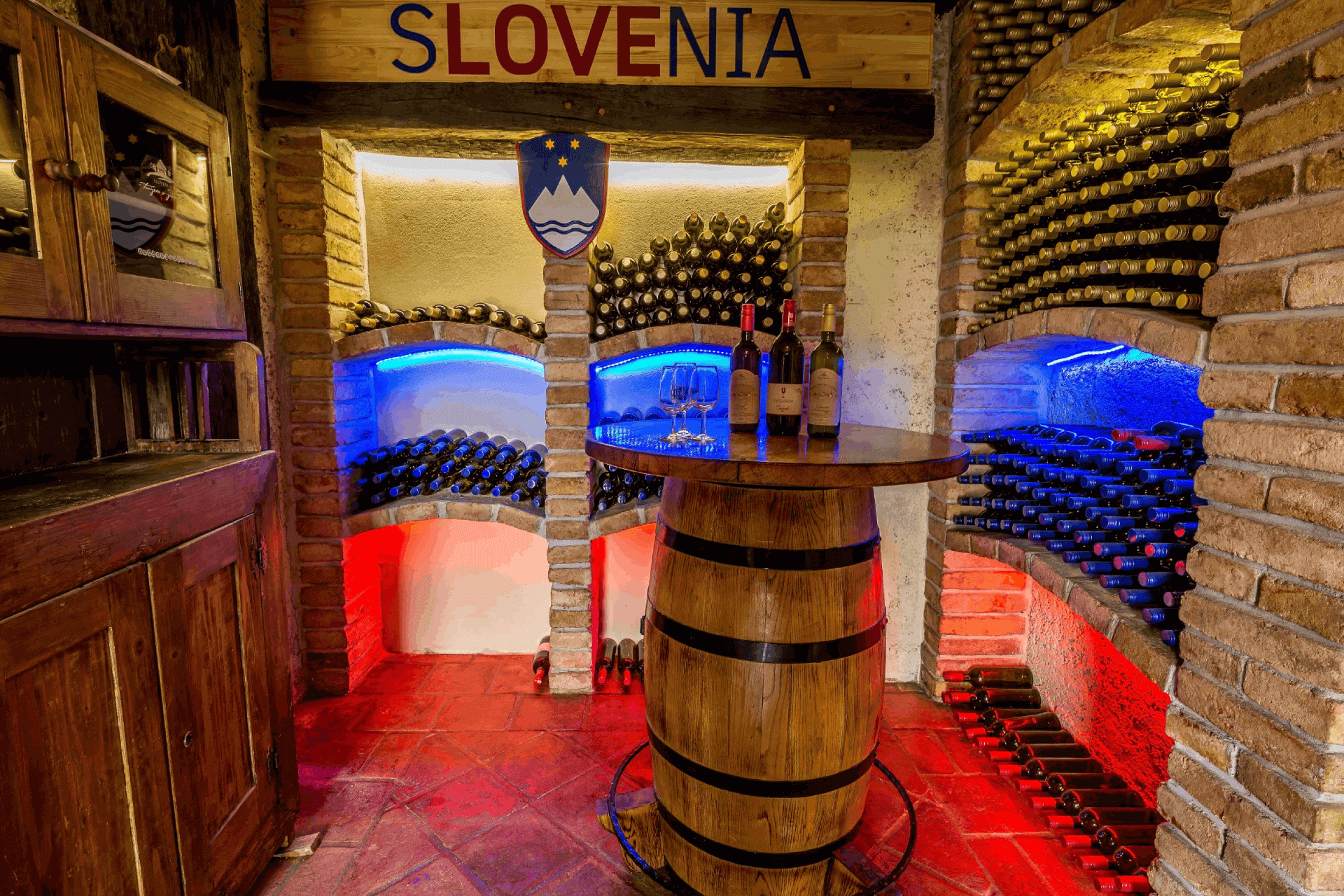
ISA: As a winner of the International Sustainable Award, what advice would you give to other individuals or businesses looking to embark on similar sustainable tourism and heritage preservation initiatives in their regions?
M.P:
The activity we engage in is the most beautiful endeavor and business opportunity that can happen in one’s life. We know that unfortunately, not everyone has these opportunities, but we appeal to those who still live in authentic rural environments and have traditional structures in their midst to consider engaging in this type of activity and tourism. We immensely enjoy our business. The primary reason for our satisfaction is that we have succeeded in preserving, restoring, and putting into operation seven heritage buildings that were destined for destruction. Secondly, we take pleasure in the fact that our guests are also extremely enthusiastic about our work and share their satisfaction with us. This is reflected in the fact that all our vineyard cottages have a rating above 9.5 on Booking.com, and we have a significant number of repeat visitors who return to our beautiful Slovenia, the world’s first green destination.
ISA: Your warm and authentic approach to guests is a notable aspect of your tourism experience. How do you ensure that every visitor feels welcomed and gains a deeper understanding of the Dolenjska region’s culture and heritage?
M.P:
The recipe is simple: if you do your work with love and passion, then you will do it with excellence for your own satisfaction and, above all, for the satisfaction of your guests. That’s why, in 13 years as hosts, we have never received a rating lower than 10. Because we love our guests and genuinely rejoice in them. Of course, we are also discreet and ensure that we are available just as much as they wish… Overall, our guests most highlight the beautiful nature, hospitality, safety, and cleanliness in their impressions.
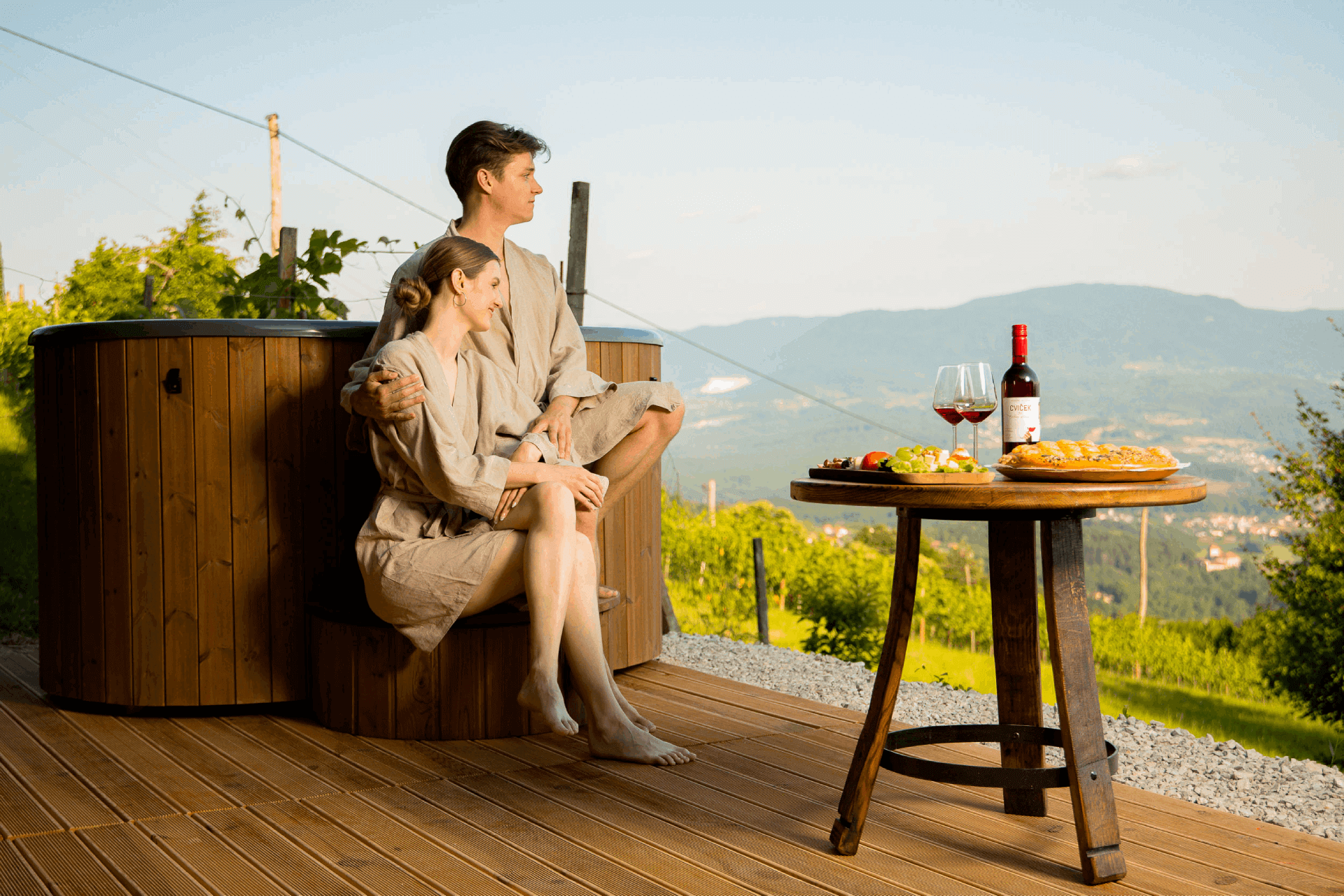
ISA: Many guests return to Matjaževa domačija & Zidanice Škatlar, which is a testament to the success of your sustainable initiatives. What plans do you have to continue promoting sustainable tourism and preserving the rich cultural heritage of Slovenia?
M.P:
In fact, we have reached a certain level that we will now more or less maintain, further improve, but we will not expand anymore. We have Matjaz’s homestead, where we host groups of tourists, and 2 km away, we have four authentic vineyard cottages that are just adequately separated to ensure intimacy. Here, we host individuals, couples, families… The operation is managed by three people: myself, my daughter Ana, who was also the 24th Wine Queen of Slovenia, and my wife Marta. The current workload is just right for us to satisfy our guests, so there will be no more expansion of the offer, only upgrades. Anything more would be beyond our capacity, and tourists probably wouldn’t feel as comfortable as they do now. It is also an art to know when to stop expanding, to avoid turning into an instant or mass product. You must always provide the guest with an individual approach and the right amount of attention, ensuring they feel welcome, enjoy their stay, and want to come back…
Thank you for sharing your incredible work, Matjaz!
For more information and to learn about Matjaževa domačija & Zidanice Škatlar, follow this link: https://www.matjazeva-domacija.si/eng/